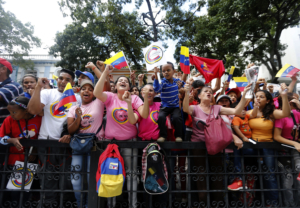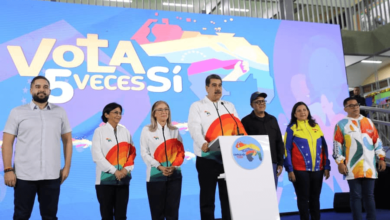
Amidst massive demonstrations, Venezuela’s Constituent Assembly has been sworn in in the country’s capital of Caracas. At the same time, the struggle between the socialist Bolivarian movement and the pro-capitalist rightwing opposition is heating-up with several figures arrested and the country’s Attorney General replaced. International media is pushing aggressively to undermine the government and fan the flames of discontent.
The enemies of the Bolivarian revolution in Venezuela are in overdrive trying to discredit the July 30 vote for Constituent Assembly delegates. Unable to break the Chavista base and set the stage for a coup, the opposition and the international supporters have no choice but to try to discredit the outcome to strengthen their relative position. At the center of this entire controversy is whether the officially declared number of voters, 8,089,320, was accurate.
This allegation is based on a few claims. With no evidence, the opposition is circulating absurdly low estimates of 2-3 million total voters. Their claim is further marred by their own so-called referendum process, occurring two weeks earlier, which lacked basic elements of a democratic vote like the secret ballot. In fact, in the rightwing’s “referendum,” all evidence required for an audit was burned! How convenient!
News agency Reuters has seen what it claims are internal documents from election officials from several hours before the polls closed that allegedly show a voter participation rate too low to support claims of eight million votes. Finally, SmartMatic, the company that made the electronic voting hardware claims they have information from their systems that show the turnout was seven million.
SmartMatic has not provided any technical information as to how they know this, and some reports have it that their role is only limited to supplying hardware and software. Almost immediately after making these declarations, SmartMatic appears to have closed their offices and removed 20 managers from the country.
Results reflect deep roots of revolutionary process
These three thinly sourced and widely divergent claims also stand in stark contrast to the performance of the Bolivarian forces at the ballot box since Hugo Chavez was elected in 1998. The largest ever vote achieved by the Bolivarian socialist movement was Hugo Chavez’s Presidential election in 2012, the last before he died in which 8,191,132 Venezuelans cast ballots for Chavez and his socialist movement. By contrast, in his first election in 1998 Chavez only received 3,673,685 votes.
Only once in the last decade have the forces of Chavismo gained less than five million votes in the five national elections during that time.
If we assume that each of the 7,587,579 people who voted for President Maduro in 2013 voted, then roughly five hundred thousand more people would have had to turn out to reach the total of just over eight million. This is a number smaller than the just over six hundred thousand vote difference between Chavez’s presidential vote in 2012 and Maduro’s total in 2013.
In other words, the announced vote total in the Constitutional Assembly election is well within the demonstrated voting base of the Bolivarian movement, if on its upper end.
Was voter turnout hurt by economic and social crisis?
The argument to bolster claims of much lower voter turnout centers on the current economic turmoil in the country. In this telling, the economic difficulties have resulted in mass desertions from the Chavista camp. There are serious reasons to doubt this narrative.
Since the 2015 National Assembly election won by the opposition served as a warning of how serious a toll the economic crisis was taking, the economic situation has clearly stabilized to a degree. While there are shortages of certain goods, the government has established a baseline through a central goods distribution program known as CLAP.
The program distributes subsidized food and basic household goods directly to just under six million households. A progressive tax overhaul has reduced the reliance on oil revenues to fund the government’s budget, over 70 percent of which is spent on various social programs and popular democratic organs. Establishing this greater fiscal certainty makes the continuation of pillar social programs much more realistic even amidst crises.
The announcement in the spring that CLAP would push to expand to six million families tellingly coincided with the rise in support (as measured by opinion polls) for the Bolivarian coalition from 27 percent in January to 35 percent in April. Datanalisis, a polling company often cited by the Western press, recorded a similar 6 percent increase in the approval rating of President Nicolas Maduro between the end of 2016 and March 2017.
In the 2015 National Assembly, despite losing their majority, the Chavista coalition tallied more votes than in 2010 when they won a majority of the votes in the National Assembly. There are other reasons to believe that grassroots participation drove voter enthusiasm as well.
The constituent process is not simply a commandist exercise. Major components of the Bolivarian coalition like the Communist Party and Fatherland for All Party presented candidates in an anti-imperialist front. Along with the Tupamaros, a socialist collective, and socialist currents inside the ruling United Socialist Party (PSUV), there were a range of radical and socialist candidates.
Yes, there are also capitalist and bureaucratic elements trying to opportunistically benefit, which only reinforces that the process contains within it real debate on how to confront various challenges and contradictions. These issues range from practical issues such as how to deal with shortages to the larger questions of how to integrate the tens of thousands of communal councils, thousands of communes and the broader areas of the economy; how much to impinge on private property and whether and how to combine workers control and nationalization of industry or what the proper balance is between the regular army and the popular militias.
Indigenous nations chose representatives to represent their communities at the assembly and Afro-Venezuelan groups are more or less united in support of and participating in the constituent process.
The revolution is taking bold steps to develop solutions that meet the scale of their problems; things that need new structures and governing processes and a new constitution.
In the face of that was a total boycott by the opposition and sanctions from the most powerful nation on earth whose President also leveled vague threats. Rank bigot Vice President Mike Pence placed a pre-election call to Leopoldo Lopez, one of the leaders of the street opposition that burns people alive just for being suspected of Bolivarian loyalties.
Both internally and internationally it became clear that this was a turning point election. A poor turnout meant the end of the Bolivarian experiment. A strong showing would give legitimacy to a deepening of the revolution and a more explicit embrace of a people-centered society, socialism.
As a turning point election it fits another pattern that buttresses the CNE election results. The ratification of the first Bolivarian constitution in 1999 opened up new space for progressive moves. It also provoked a vicious backlash by capitalist elites who launched an employer lockout to sabotage the economy and ultimately launched a coup in 2002. The coup, the first major turning point, was defeated after mass crowds thronged the streets of Caracas demanding the return of President of Chavez.
In 2004, the opposition attempted to recall President Chavez who they felt was still weak from the failed coup attempt. In 1998, Chavez had been elected with roughly three million votes. In 2004, over five million went to the ballot box to support him in a second major turning point election. After the victory in the referendum, the Bolivarian process began to radicalize and implement large scale social missions and promote the growth of communal structures.
In 2006, President Chavez, having been vilified by major powers but celebrated for the remarkable social achievements of Venezuela was facing a major test. Some 74.6 percent of the eligible voting population showed up. Chavez and the socialist camp won 62 percent of those votes as 7.3 million people raised the red flag at the ballot box reaffirming the mass support for the radical turn of the Venezuelan process.
After a failed constitutional reform in 2007, Chavismo was facing the reality that their leader was term-limited. The socialist bloc rallied two million more voters to their banner than in 2007 as 54 percent of voters ratified the abolition of term limits giving new life to the Bolivarian coalition.
In 2012, the opposition nominated Henrique Capriles, the most electrifying candidate they had yet fielded, who demagogically and totally disingenuously ran on a Chavismo-light campaign. This drove turnout to 80 percent and saw Chavez walk away with the convincing victory of 55 percent of the electorate, eight million votes.
Just over seven million rallied to save the Bolivarian government from disaster in 2013 after the tragic death of Hugo Chavez. It seems imminently plausible then that a movement that has rallied at the ballot box at critical moments; the masses who defeated a coup with nothing but the presence of their bodies; the neighborhoods that formed councils and communes; the movement that seized land from oligarchs and occupied the factories of industrialists; a movement that is forming armed defense brigades to defend that seized land and those occupied factories from opposition sabotage attempts; that a movement like that would rally one more time when their process to build another world was threatened.
Opposition divided by results, dangers remain
The final confirmation that the turnout on July 30 was indeed robust is the split in the opposition and the cautious statements of U.S. officials who have stressed “dialogue.” Some State Department figures have tried to tamp down speculation about U.S. support for a coup.
Major opposition party Acción Democrática has already announced they will participate in regional elections in December. These forces recognize that the violent opposition protests have failed to paralyze the country to the point where a coup is possible, and failed to expand its base beyond the more affluent areas of the country.
However, violent protests will continue, the opposition is split, and some such as Maria Corina Machado, Leopoldo Lopez and Fredy Guevara want to establish an alternate government. Some forces internationally undoubtedly will continue to rally to their cause.
Without any doubt the struggle will become sharper as this happens. The government will undoubtedly take measures to protect the Bolivarian movement and the opposition will most likely escalate their violence in certain areas. The international media, the major imperialist governments, and right wing movements will claim that any suppression of opposition forces is a terrible breach of democracy by an authoritarian dictatorship.
They will never truly explain what’s really at stake. They won’t pose the question as being a struggle between the hope of true progress and a country being dragged backed into the morass of inequality and squandered wealth dominated by a few elites.
For progressive people who think housing, education, healthcare, should be rights, that believe the shameful histories of genocide of the indigenous and the enslaving of Africans in the Americans must be confronted; these people must stand shoulder-to-shoulder with the Bolivarian revolution. If it is crushed, a beacon of hope for all the causes just mentioned will be snuffed out.






